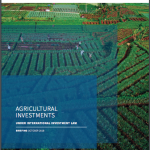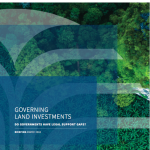A printable version of this primer is also available here. [Updated as of May 31, 2019] What Are International Investment Agreements (IIAs)? IIAs are bilateral or multilateral treaties that commit state-parties to afford specific standards of conduct to foreign investors from the other state-parties. These treaties grant foreign investors certain benefits, including recourse to Investor-State… read more
Land contracts (also known as investor-state contracts, or concession agreements) show what commitments a forestry, farming or renewable energy company has made and what the government has said the company can do on the land. These promises define the positive and harmful effects the company’s project could have on community members’ livelihoods and human rights,… read more
Prepared for the T20 Task Force on Trade, Investment and Globalization, as an input into the 26-27 May 2019 G20 Summit chaired by Japan, this brief notes that there is growing support behind an international framework to facilitate investment for sustainable development. It suggests that the G20 consider adopting Guiding Principles on Investment Facilitation for Sustainable… read more
The Hague Rules on Business and Human Rights Arbitration, initiated by the Business and Human Rights Arbitration Working Group, aims to create an international private judicial dispute resolution avenue available to parties involved in business and human rights issues, thereby helping to address the significant remedy gap faced by victims of business-related abuses. With the… read more
Sustainable investing, otherwise know as Environment, Social and Governance (ESG) investing, has become a significant part of the investment management industry since 2006. There is an increasing acceptance of the investment merits of investing with ESG considerations across large parts of the investment industry. The next era of ESG investing will witness an increase in… read more
UNCITRAL has a vital role to play in exploring problems with and potential reform of ISDS, and in considering how to ensure its work better promotes, and does not undermine, rule of law, other domestic and international commitments and policies, and the globally agreed Agenda 2030. As the process moves forward, it is essential for… read more
CCSI, jointly with The Observatory for Sustainable Infrastructure, submitted comments to the UNCITRAL Secretariat regarding updates to the UNCITRAL Legislative Guide on Privately Financed Infrastructure Projects. CCSI’s comments focused on the need for an updated guide, which will now refer to Public Private Partnerships, to holistically and systematically incorporate considerations of: (1) sustainable development and the SDGs, (2)… read more
CCSI submitted an amicus brief to the Constitutional Court of Colombia concerning the Tutela hearing of Mansarovar Energy Colombia Ltd. v. Tribunal Administrativo del Meta (The Consulta Popular of Cumaral, Meta). The hearing concerned a challenge by Mansarovar Energy Colombia Limited of a municipal-wide referendum (the Consulta Popular) concerning whether or not the extraction of… read more

International investment law, based primarily on international investment treaties, plays an important role in the governance of investment in agriculture, forestry, and fishing. The obligations established by these treaties, and enforced by means of investor–state arbitration, can present challenges for policy-makers and others seeking to ensure that investments are sustainable, including by affecting the ways… read more

In the wave of efforts to encourage and support more “responsible” land investments, one aspect has been largely overlooked: are governments equipped with the legal and technical support needed to effectively negotiate and conclude investment contracts that lead to responsible outcomes? CCSI researched how host governments access legal support in the planning, negotiation, and monitoring… read more





